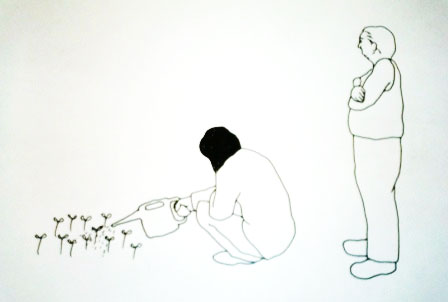若き学生時代に急遽海外放浪の旅に踏み出し、その経験から外国人賃貸業界に深い興味を抱くようになったのが、イチイ社長・荻野氏です。このコラムでは、そんな荻野の体験をコラム形式でお届けします。
※本コラムは『異文化共生住宅』をテーマにイチイ社長 荻野が2005年1月から2006年3月まで週刊住宅に寄稿したものです。
あ~勘違い!空き地は共用部?カイワレ大根の芽がスクスク
日本に来たばかりの外国人が、習慣の違いからおかしな行動を取り、周りをびっくりさせたり、笑わせたりすることはよくある。サラダをラーメン丼に盛ってみたり、ご飯に醤油をかけたり(日本人でもいそうだ)。そうかと思うと「日本の電気製品は世界一!スイッチだけでOKさ」と、洗剤を入れずに洗濯機を回し「汚れが落ちない!」と、3回も回してから管理人室に原因を聞きに来る外国人。当社の運営するゲストハウスなどではこんな光景は珍しくない。
先日も、「どうしたら良いのでしょうかね?共用部を専用的に使わせるわけにいかないよね」と、困り顔でアパートの家主がやってきた。実は入居者のチョウさん(中国出身)がアパートの窓先空地(東京都の安全条例で、災害時の避難・救助のために確保しなくはいけない空地)を自分の部屋の前庭と勘違いして、勝手に畑に変えてしまったらしい。
今まで、入居者で草むしりをする人などはいなく、除草は家主が自分でやっていた。そのため、草をむしり共用部を綺麗にしてくれるチョウさんのことを、家主は感心して見ていた。だが、1週間後嬉しそうに水を撒いているチョウさんの足元からスクスクと伸びているカイワレ大根の芽を発見してしまったのだ。
(財)日本賃貸住宅管理協会が、「外国人の居住安定のためのガイドライン」の作成にあたり実施した「家主アンケート」によれば、外国人へ賃貸する場合の不安点として、「生活ルール上のトラブル発生」を挙げている家主が60%あった。が、不安を抱くようになった要因として、「自分の経験上から」と回答する者はわずか10%であり、他は「TV・新聞報道・近隣の噂・・40%」「何となく不安・・31%」「知人などのトラブル話を聞いて・・27%」であった。また、アンケートの結果、家主が一番懸念しているのは「トラブルが発生したとき、誰がきちんと対処してくれるのか」であった。
どうやら異文化共生住宅の課題としては、トラブル回避も重要であるが、その対処方法、そして対処してくれる管理者がポイントになりそうだ。

Responding to Cultural DifferencesAh, a misunderstanding! Is the vacant lot a common area?The sprouts of radish sprouts are thriving.
It’s common for foreigners who have just arrived in Japan to engage in peculiar behaviors due to cultural differences, surprising or amusing those around them. For instance, serving salad in a ramen bowl, or pouring soy sauce on rice (something even Japanese might do). Or thinking “Japanese electrical appliances are the best in the world! Just flip the switch,” and running the washing machine without detergent, then running it three times before asking the caretaker why the stains aren’t coming out. Such scenes are not uncommon in guesthouses operated by our company.
Recently, an apartment landlord came looking troubled and said, “What should we do? We can’t allow common areas to be used privately, can we?” It turns out that Mr. Zhou (from China), a tenant, had mistaken the space in front of the apartment’s window (a vacant lot required by Tokyo Metropolitan safety regulations for evacuation and rescue during disasters) for his own front yard and had converted it into a garden without permission.
Previously, no tenant had weeded the area, and the landlord had been taking care of the weeding himself. Therefore, the landlord had been impressed watching Mr. Zhou diligently weeding and keeping the common area clean. However, a week later, he was startled to discover radish sprouts vigorously growing where Mr. Zhou was happily watering.
According to a “Landlord Survey” conducted by the Japan Rental Housing Management Association in the creation of “Guidelines for the Stable Residence of Foreigners,” 60% of landlords expressed anxiety about “troubles arising from lifestyle rules” when renting to foreigners. However, only 10% attributed their concerns to their own experiences, while the rest were influenced by “TV/news reports and neighborhood rumors—40%”, “general unease—31%”, and “stories of troubles heard from acquaintances—27%”. Furthermore, the landlords’ primary concern was “who will properly handle situations when troubles occur.”
It seems that avoiding troubles is important in multicultural co-living housing, but the methods of dealing with them and having a manager who can handle them properly are key points.
文化差异的应对 啊~误会了!空地是公共区域吗?萝卜苗茁壮成长
刚来日本的外国人由于习惯不同,常常采取一些奇怪的行为,让周围人感到惊讶或发笑。比如,将沙拉盛放在拉面碗里,或者在饭上倒酱油(似乎连日本人也会这么做)。或者认为“日本的电器产品是世界第一!只要开关一按就行”,不放洗涤剂就开洗衣机,“脏污没洗掉!”洗了三次后才去问管理员原因。在我们公司运营的宾馆里,这样的场景并不少见。
最近,一位公寓的房东带着困惑的表情来到这里,说:“我们该怎么办呢?不能让他们把公共区域当作私人使用吧?”事实上,住户周先生(中国人)误将公寓窗前的空地(东京都安全条例规定,必须保留的用于灾害时的疏散救援空地)当作自己的前庭,并擅自改造成菜园了。
以前,没有住户会除草,除草工作都是房东自己来做。因此,房东一直很欣赏周先生努力除草、保持公共区域清洁的行为。但是,一周后,他惊讶地发现周先生在快乐浇水的脚边,竟然冒出了生机勃勃的萝卜苗。
根据日本租赁住宅管理协会在制定《外国人居住稳定指南》时进行的“房东问卷调查”,有60%的房东表示出租给外国人时担心“生活规则上的纠纷”。然而,只有10%的人将其不安归咎于自己的经验,其他则因为“电视·新闻报道·邻里传言——40%”、“不安的感觉——31%”、“听说过熟人的麻烦——27%”。此外,问卷结果显示,房东最担心的是“出现问题时,谁能妥善处理”。
看来,在异文化共生住宅中,避免问题固然重要,如何处理这些问题,以及由谁来处理,似乎也是关键。
荻野社長ブログはコチラ▶ https://co-lifestyle.net

